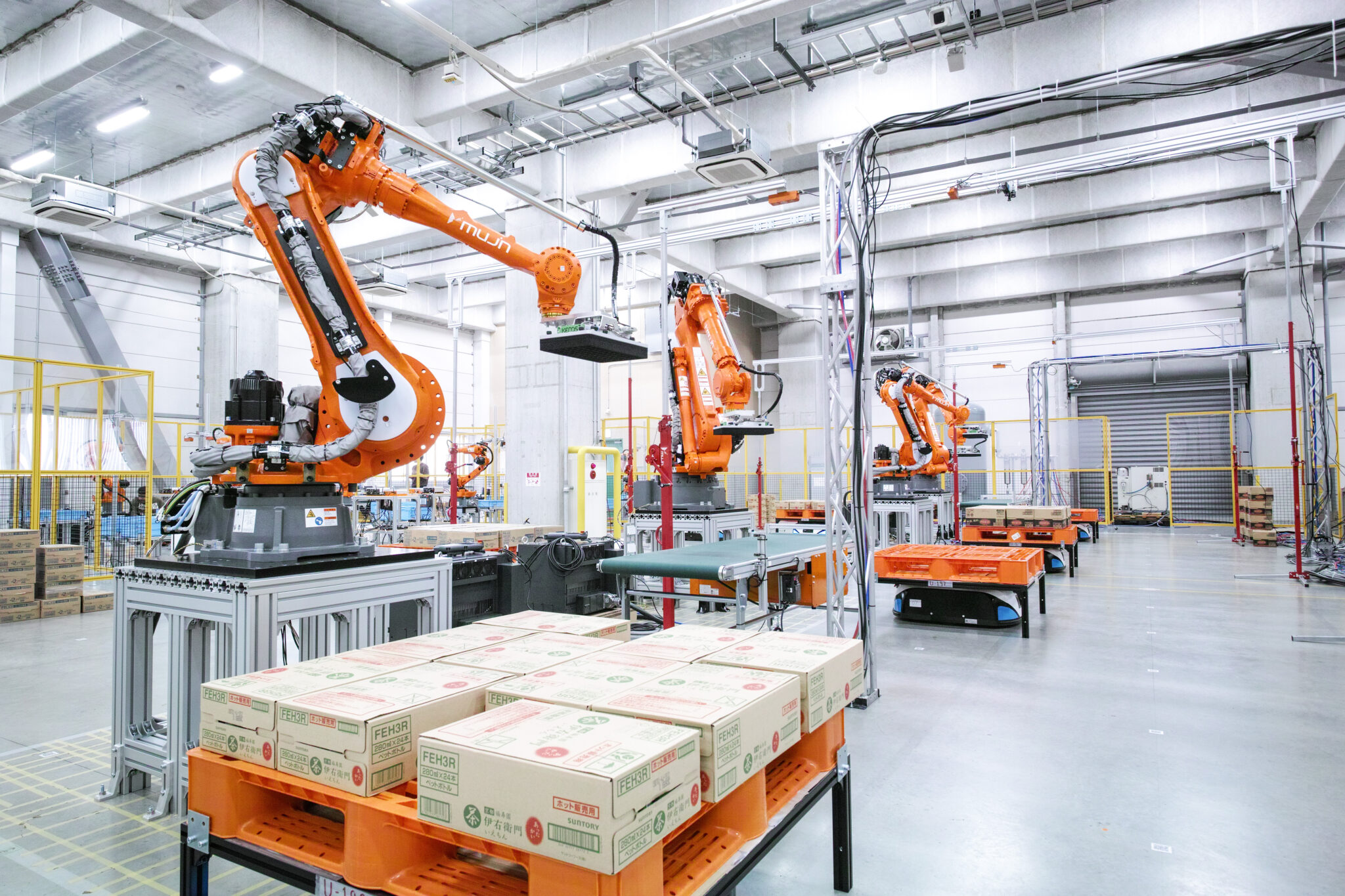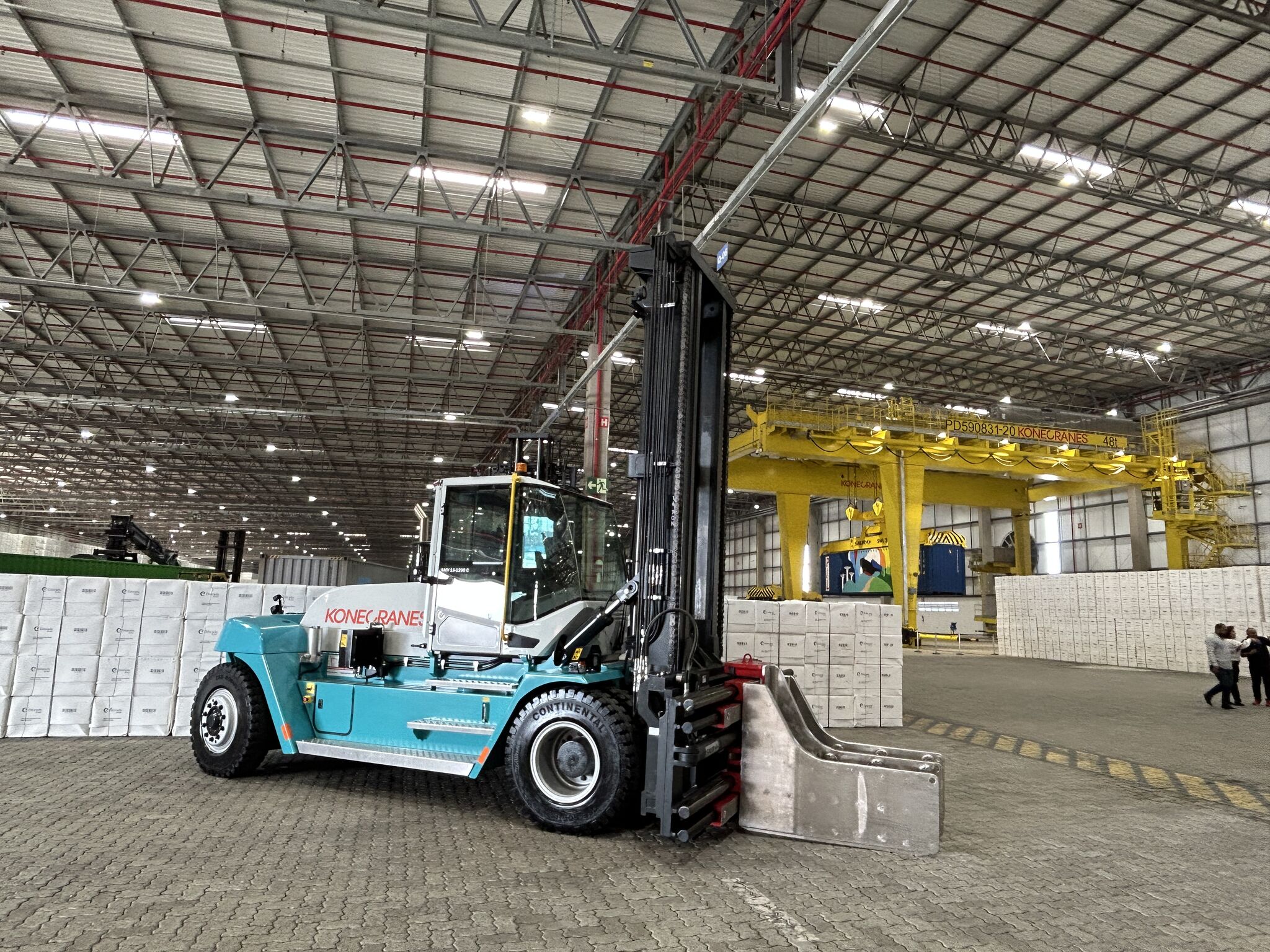Intralogistics specialist Linde Material Handling and the Aschaffenburg University of Applied Sciences (UAS) presented the results of the research project “KAnIS – Cooperative Autonomous Intralogistics Systems” with live demonstrations on the test site at the Linde plant in Aschaffenburg on December 5, 2023. In several subprojects, solutions were developed for the demanding applications of autonomous counterbalanced forklifts, which transport loads both indoors and outdoors. One focus was on the cooperative behaviour of these vehicles that exchange information in real time via a 5G network and an edge server and can warn each other of obstacles. The project, which ran for almost four years, was funded with approximately 2.8 million euros as part of the Free State of Bavaria’s ‘Information and Communication Technology’ R&D program.
“Autonomous vehicles will gradually take over more and more transport tasks,” asserts Stefan Prokosch, initiator of the KAnIS project at Linde MH. As a technology leader in the industry, the intralogistics specialist wants to make the benefits of autonomous vehicles available to customers who use counterbalanced forklifts to transport goods or load and unload heavy trucks. “However, the requirements for forklifts operating in outdoor areas are much higher than those for purely indoor vehicles. These include the ability to operate on inclines and gradients, the presence of a significantly higher volume of people and traffic and different weather influences and temperature conditions that need to be taken into account,” Prokosch explains. “Thanks to the joint research work with Aschaffenburg UAS, we have been able to develop viable solutions for these complex requirements. Once the project is completed, these findings will form an essential basis for further development projects.”
The overall goal of the project was to investigate how the cooperative behaviour of networked, autonomous vehicles can improve operational reliability and handling performance. To solve this broad task, several subprojects were formed to address vehicle location, regulation and control as well as forklift cooperation, load carrier recognition, the impact of weather influences, predictive maintenance, route optimization and automatic load management.
“For the university, the KAnIS project was a very complex, interdisciplinary research project. Ten professors and numerous research assistants and students were involved,” summarized Prof. Dr. Hans-Georg Stark, Project Manager KAnIS, Faculty of Engineering at Aschaffenburg UAS, during the event. “Both project partners have benefited greatly from the intensive exchange between Aschaffenburg UAS’s scientific research activities and Linde MH’s many years of expertise in vehicle development.”
Practice-oriented test scenarios under realistic conditions
Four Linde E20, E25 and E30 electric counterbalanced trucks with a load capacity of 2.0 to 3.0 tons were automated and equipped with electrohydraulic steering (Linde Steer Control), the Linde Safety Pilot assistance system with electronic load diagram and an integrated fork positioner. “The practical implementation of the research results was an important aspect for both Linde MH and Aschaffenburg UAS,” emphasized Mark Hanke, a Head of Department in Pre-Development at Linde MH. Starting next year, the vehicles are to be further developed and tested so that they can perform four specific material handling tasks in the future. These include the transport of wire mesh crates and of pallets containing batteries, and the relocation of vehicle frames and overhead guards, which have to be transported on special load carriers from pre-assembly to the main assembly lines.
The first two applications are purely outdoor operations, while the other two require the trucks to travel both inside and between the halls. Gradients of 8 percent have to be overcome, and there are also other AGVs and manually operated vehicles in the halls. To ensure that the four KAnIS forklifts can reliably pick up the pallets, wire mesh crates and metal frames even if they are not precisely aligned with the floor, they are equipped with a mobile camera mounted between the forks. It measures the pockets of the load carrier so that the forks can be positioned correctly via the side shift. The designs of the vehicle frame, battery door and counterweight were adapted as well. “Our goal was to integrate the safety scanners, cameras and sensors as much as possible into the vehicle contour so that the truck’s dimensions remain as close as possible to the standard version,” says Hanke. Indoors, the vehicles locate themselves via laser scanners, outdoors, they use differential GPS (Global Positioning System), a method of increasing the accuracy of GPS. In addition, they feature additional local sensors for the switch from indoor to outdoor areas. Unlike their manually operated counterparts, the automated forklifts always travel in reverse on their defined routes to prevent the load from slipping off the forks in the event of an emergency stop.
Real-time communication with trucks and infrastructure
A particular focus of the research project was on the automated forklifts’ perception of their surroundings in order to ensure their reliable interaction with other road users. For this purpose, the vehicles are equipped with 3D scanners and HD cameras in addition to the sensors of the personal protection system. The camera data forms the basis for detecting and classifying objects with the help of AI algorithms and then locating them in order to adjust the vehicle’s speed and slow it down to a standstill. But that’s not all. Another key issue focused on critical situations that arise when people are in concealed areas that cannot be detected by the forklift’s sensors and approach the vehicle’s path of travel. This is where cooperation between the forklift trucks comes into play, because if another forklift is in the vicinity, it can provide the relevant information. However, this requires real-time transmission of the perception data. To achieve these low latencies, Linde has set up a private 5G network at the Aschaffenburg plant. The perception data is transmitted from the forklifts to an edge server, which uses the locally detected objects to create a global list of all detected objects and sends it back to the forklifts.
The test was conducted using a crash-test dummy that suddenly emerges from behind a wall and runs into the forklift’s path. Without cooperative behaviour, the automated forklift truck cannot stop in time and runs into the dummy. However, if it receives real-time information from a nearby forklift, it can anticipate the dangerous situation in advance and brake in time. Since it is not always possible to assume that a second forklift is nearby, eight stationary 3D laser scanners were installed at intersections and gateways along the routes that the KAnIS forklift trucks will travel in the future. The local object lists of the stationary laser scanners are also merged on the edge server and the information is made available to all vehicles.
“Fast wireless networks are the prerequisite for autonomous forklifts to be able to act cooperatively in outdoor areas and react to unforeseen traffic situations in real time,” emphasized Prof. Dr. Klaus Zindler, Vice President for Research and Transfer at Aschaffenburg UAS, at the event. “Our goal is to develop general standards and algorithms using AI methods, which can then be flexibly applied to different vehicles and applications and continue to learn.”
Cleaning system for sensors, battery charging by robot
Another work package looked at how to clean the near-ground optical sensors when they become dirty from water splashes in the rain or wet road surfaces. This is critical because if reliable object detection is no longer possible, the operator protection system will automatically bring the truck safely to a stop. To prevent this, the project team developed a cleaning system that uses compressed air to blow off any dirty water droplets that may have collected on the laser scanners.
Another project team investigated possible solutions for autonomous charging of the forklift batteries. The result was in favour of an AI-based robot that connects the charging plug to the forklift’s charging socket. The rear of the truck was modified accordingly and an automatically operated charging flap was added to protect the charging socket from dirt and splash water.











